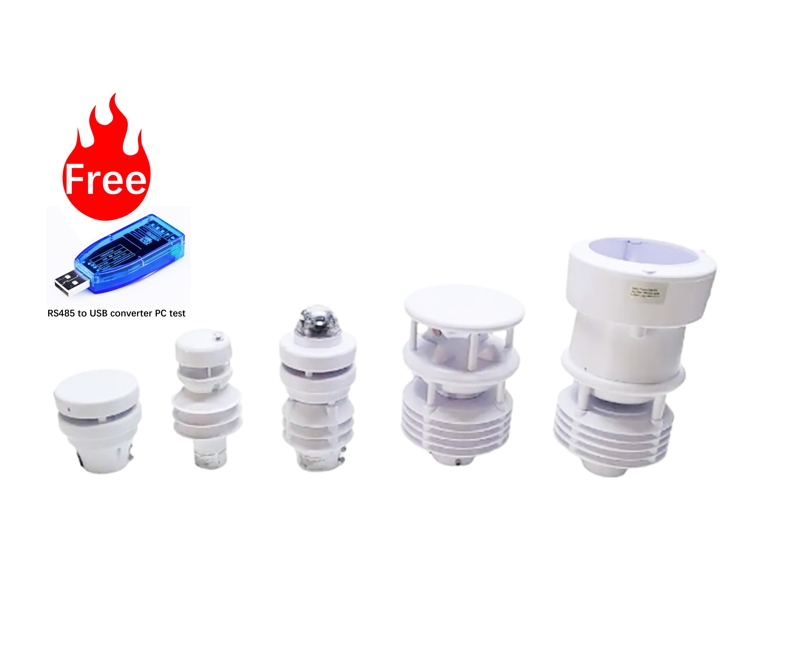Inanunsyo ng gobyerno ng UK na ang mga advanced smart weather station ay ilalagay sa ilang bahagi ng bansa upang mapabuti ang katumpakan ng pagsubaybay at pagtataya ng panahon. Ang inisyatibong ito ay nagmamarka ng isang malaking hakbang pasulong sa mga pagsisikap ng UK na harapin ang pagbabago ng klima at mga kaganapan sa matinding panahon.
Ang pandaigdigang pagbabago ng klima ay humantong sa mas matinding mga kaganapan sa panahon nitong mga nakaraang taon, at hindi ligtas ang UK. Ang matinding panahon tulad ng malakas na ulan, pagbaha, mga alon ng init at mga blizzard ay nagkaroon ng matinding epekto sa transportasyon, agrikultura at imprastraktura ng lungsod sa UK. Upang mas matugunan ang mga hamong ito, inilunsad ng UK Met Office ang Smart Weather Station Deployment Programme.
Ang smart weather station ay isang uri ng kagamitan sa pagsubaybay sa panahon na pinagsasama ang iba't ibang mga advanced na sensor at teknolohiya sa komunikasyon. Kung ikukumpara sa mga tradisyunal na weather station, ang mga smart weather station ay may mga sumusunod na bentahe:
1. Pagkuha ng datos na may mataas na katumpakan:
Ang smart weather station ay may mga high-precision sensor na kayang subaybayan ang temperatura, humidity, presyon ng hangin, bilis ng hangin, direksyon ng hangin, ulan at iba pang meteorological parameters sa real time. Ang mga sensor na ito ay maaaring magbigay ng mas tumpak na datos ng panahon at magbigay ng maaasahang batayan para sa mga pagtataya ng panahon.
2. Pagpapadala ng datos sa totoong oras:
Dahil sa gamit ng makabagong teknolohiya sa komunikasyon, ang smart weather station ay kayang magpadala ng nakalap na datos sa isang sentral na database nang real time. Nagbibigay-daan ito sa mga meteorologist na ma-access ang pinakabagong impormasyon sa meteorolohiya sa tamang oras, kaya naman mas napapanahon at mas tumpak ang mga pagtataya ng panahon.
3. Awtomasyon at katalinuhan:
Ang smart weather station ay may awtomatiko at matalinong mga tungkulin, na maaaring awtomatikong mangolekta, mag-analisa, at magpadala ng datos. Hindi lamang nito binabawasan ang manu-manong pagkakamali, kundi pinapabuti rin nito ang kahusayan sa trabaho.
4. Kakayahang umangkop sa kapaligiran:
Ang mga smart weather station ay dinisenyo upang maging matatag at madaling umangkop sa iba't ibang malupit na kondisyon sa kapaligiran. Ito man ay matinding mataas na temperatura, mababang temperatura, malakas na hangin o malakas na ulan, ang smart weather station ay maaaring gumana nang matatag.
Plano ng UK Met Office na magtalaga ng mahigit 500 smart weather station sa buong bansa sa susunod na tatlong taon. Ang mga unang smart weather station ay naipatupad na noong Enero 2025 sa mga sumusunod na lugar:
1. London: Bilang kabisera ng United Kingdom, ang pagsubaybay sa panahon sa London ay lalong mahalaga. Ang paglalagay ng mga smart weather station ay makakatulong na mapabuti ang katumpakan ng mga pagtataya ng panahon sa lugar ng London, na magbibigay ng mas mahusay na proteksyon para sa trapiko sa lungsod at sa buhay ng mga residente.
2. Ang Scottish Highlands: Ang Highlands ng Scotland ay may masalimuot na lupain at iba't ibang klima. Ang paglalagay ng mga smart weather station ay makakatulong sa mga meteorologist na mas mahusay na masubaybayan ang mga pagbabago sa meteorolohiya sa rehiyon at magbigay ng mas tumpak na impormasyon sa meteorolohiya para sa mga lokal na residente at turismo.
3. Ang katimugang baybayin ng Inglatera: Ang lugar na ito ay madalas na nanganganib ng mga bagyo at tsunami. Ang paglalagay ng mga smart weather station ay magpapabuti sa mga kakayahan ng rehiyon sa pagsubaybay sa meteorolohiya at magbibigay ng matibay na suporta para sa pag-iwas at pagbabawas ng sakuna.
4. Mga Lambak ng Welsh: Ang rehiyon ng Mga Lambak ng Welsh ay may masalimuot na lupain at pabago-bagong klima. Ang paglalagay ng mga smart weather station ay makakatulong na mapabuti ang katumpakan ng mga pagtataya ng panahon sa rehiyon at magbigay ng mas mahusay na proteksyon para sa lokal na agrikultura at buhay ng mga residente.
Inaasahang epekto
Ang paglalagay ng mga smart weather station ay inaasahang magkakaroon ng malaking epekto sa mga sumusunod na aspeto:
1. Pagbutihin ang katumpakan ng taya ng panahon: Ang mataas na katumpakan ng datos na ibinibigay ng mga smart weather station ay lubos na magpapabuti sa katumpakan ng mga taya ng panahon, na magbibigay-daan sa mga meteorologist na mas tumpak na mahulaan ang tiyempo at tindi ng mga kaganapan sa matinding panahon.
2. Palakasin ang mga kakayahan sa pag-iwas at pagpapagaan ng sakuna: Sa pamamagitan ng real-time na pagsubaybay at mga sistema ng maagang babala, ang mga smart weather station ay makakatulong sa mga pamahalaan at mga kinauukulang departamento na mas mahusay na tumugon sa mga kaganapan sa matinding panahon at mabawasan ang mga pagkalugi sa tao at ari-arian.
3. Suportahan ang napapanatiling pag-unlad: Ang datos meteorolohiko na ibinibigay ng smart weather station ay makakatulong sa pagsuporta sa pag-unlad ng maraming larangan tulad ng agrikultura, enerhiya at transportasyon, at itataguyod ang napapanatiling pag-unlad ng ekonomiya ng UK.
Sinabi ng pinuno ng UK Met Office na ang paglalagay ng mga smart weather station ay isang mahalagang hakbang sa pagpapabuti ng kakayahan ng UK sa pagsubaybay at pagtataya ng panahon. Sa hinaharap, patuloy na pagbubutihin ng Met Office ang mga tungkulin ng mga smart weather station at susuriin ang mga bagong teknolohiya sa pagsubaybay sa panahon upang matugunan ang lalong masalimuot na mga hamon ng pagbabago ng klima.
Binigyang-diin din ng gobyerno ng Britanya na ang pagpapabuti ng kakayahan sa pagsubaybay at pagtataya ng panahon ay isa sa mahahalagang hakbang upang matugunan ang pagbabago ng klima. Sa pamamagitan ng pag-deploy ng mga smart weather station, mas makakayanan ng UK ang mga matinding kaganapan sa panahon, mapoprotektahan ang buhay at ari-arian ng mga tao, at mas maitataguyod ang napapanatiling pag-unlad ng lipunan.
Para sa karagdagang impormasyon tungkol sa mga istasyon ng panahon,
mangyaring makipag-ugnayan sa Honde Technology Co., LTD.
Email: info@hondetech.com
Website ng kompanya:www.hondetechco.com
Oras ng pag-post: Enero 07, 2025


